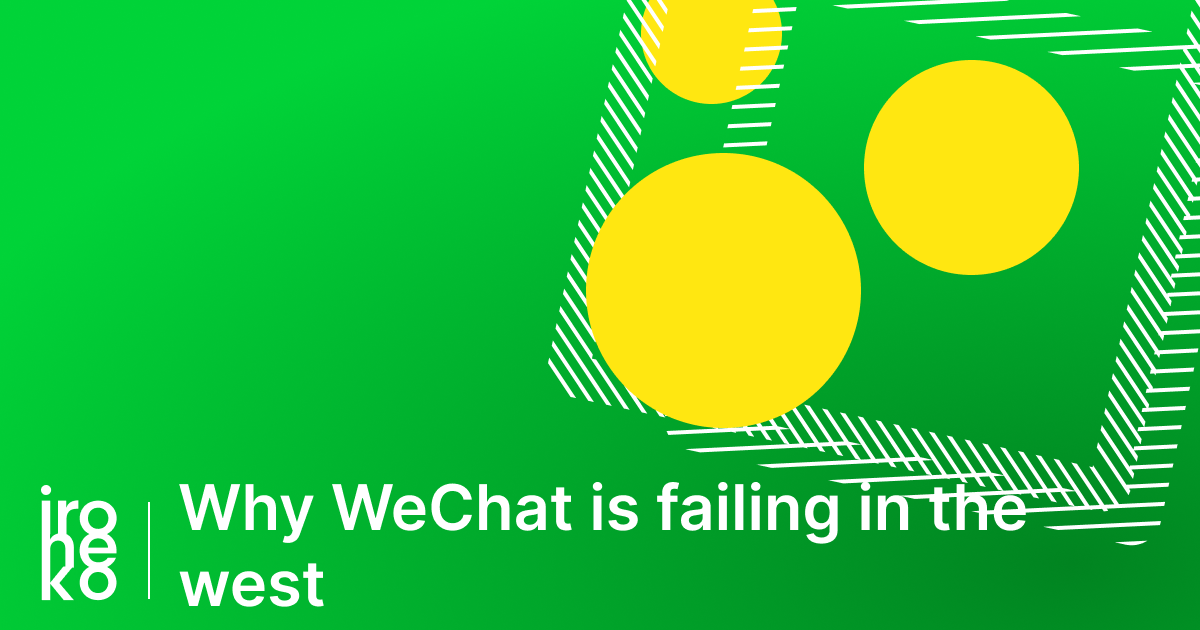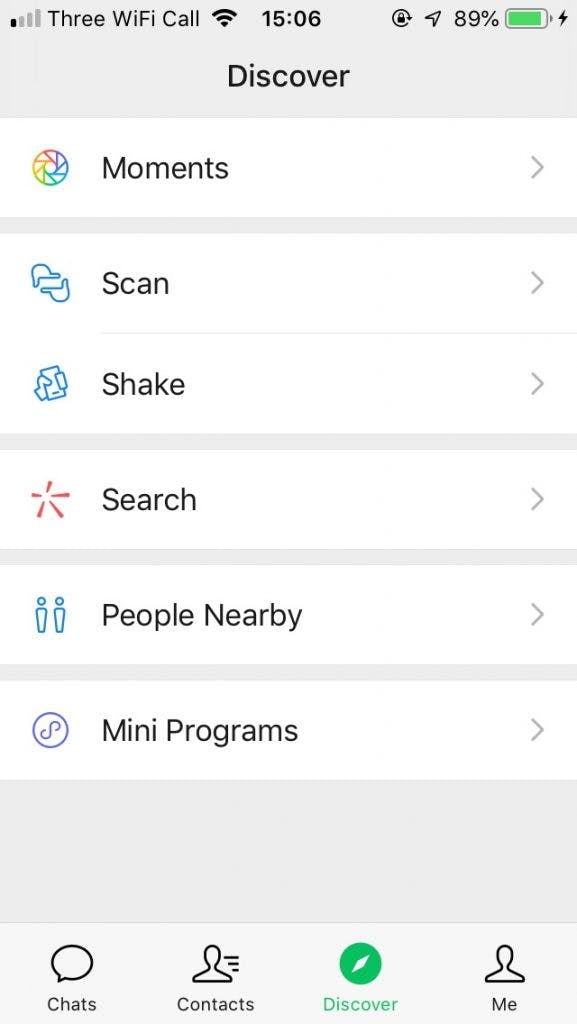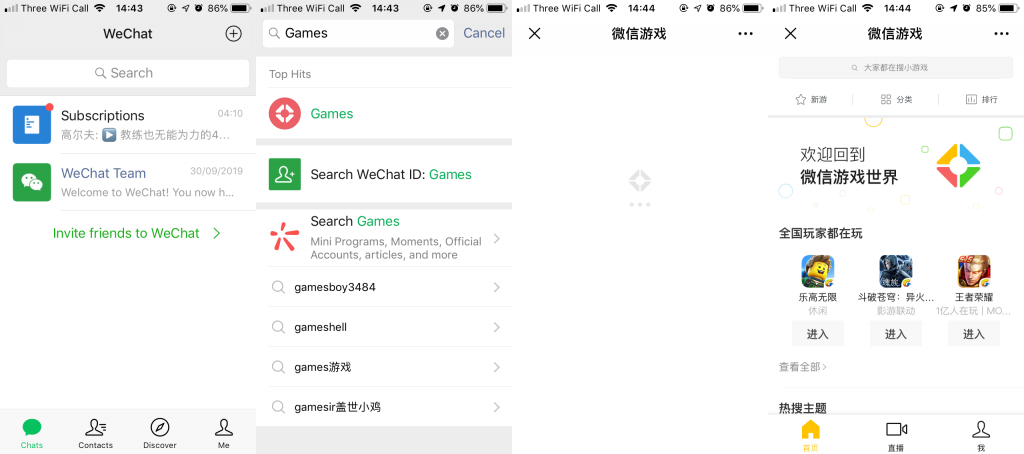WeChat: why is it failing to compete in the West?
WeChat is the most popular smartphone app in China. Having conquered that market, it's spent the past few months trying its hardest to break into the western world. Here's why that's not going to happen.

What is WeChat?
The answer to this question is a little complicated. At its core it's a messaging app, yes, but it's been expanded to do a lot more. In China, WeChat is used for essentially everything, including games, payments, transport, and even sharing important documents.
If this sounds like a mess to you, then... well, you're absolutely correct. It's a usability nightmare. Functionality is hidden away in sub-menus of sub-menus, and accessing parts of the app sometimes requires the use of a search-bar that will then redirect you to a store front.
I understand that this is to be expected from all the functionality that has been tacked onto it, but it's still a major problem. While most Chinese users seem to be absolutely fine with it, for westerners that have been spoiled by decades of UX research, finding your way around WeChat's extra features can be near impossible.
Not that this matters a great deal however, because about 95% of WeChat (and its user created content) is still written in Chinese. So for people who don't speak Chinese, it's functionality doesn't extend much past that of a simple messaging app. And in Europe, America and the UK, Facebook Messenger has that covered.
However, if WeChat did improve its usability, it could really go places globally and become key to the success of many business.
WeChat's Potential
Google "Marketing on WeChat", and you'll find a vast amount of articles heralding the app as a bridge between China and the rest of the world. Reading these, I was excited. It was exactly what we needed. After all, the Chinese market can be impenetrable.
I'm currently in the process of understanding how to use WeChat as a business to help my company expand into China. However, despite many people's efforts, we've barely passed the goalpost of securing a working account (for mind-bogglingly convoluted reasons that I'll discuss below)
Indeed, most of the promising articles, on closer inspection, were simply conjecture. I don't blame them though: on paper, WeChat is the perfect marketing tool for companies looking to expand into the Asian market. And there is a necessity for an app like this.
Why WeChat is Failing in The West
WeChat has a slew of problems, from small annoyances to major usability issues. Unfortunately Tencent (the company currently spending millions to push WeChat into the western market) seems to be either unaware of these or has decided to just not address them.
In case you're not convinced yet, here are some of the more pressing issues I've discovered while using it:
1. WeChat is not a secure messaging platform
Simply put, WeChat is used by the Chinese Communist Party for mass surveillance of its citizens. And that's no conspiracy theory. There's an article from the BBC about this very subject.
The CCP had a major hand in the rise of WeChat. Knowing this gives us some insight into why the app is used for absolutely everything in Mainland China. After all, surveying one app is a lot easier than surveying a hundred.
Crucially, WeChat doesn't have the end-to-end encryption that most other successful messaging apps benefit from. On Whatsapp and Telegram for example, only the receiver of the message would have the "key" to decrypt the sent message. On WeChat however, anyone from Tencent can see what you're writing.
This has serious implications for global users. Indeed, the vast majority of WeChat server's are located in China, meaning that they are outside Europe's privacy laws jurisdiction.
2. Making an account is not easy
If you're familiar with western social networks, you'll know that the registration process is usually two things: quick, and easy. Simply type your email and a password and you're done. WeChat on the other hand requires you to use a phone number, and thanks to its unclear rules, getting that phone number blocked is extremely easy.
Here's how it happened for me, twice.
After asking for my phone number and sending me two text messages to make sure I was a real person, WeChat had finally confirmed my registration.
Back in the homepage I proceeded to login, only to be met with an error message:
"Your account has been restricted because of unusual activity"
Now, you can probably imagine my confusion at this point. I have never used this account - it's literally been registered - but apparently something about the way I signed up for my account was unusual or suspicious.
The only way to unblock it? Find someone that has used WeChat for more than 6 months and ask them to go through a lengthy verification process to help me out.
As you can imagine, finding someone with a 6 month old WeChat account in the west is NOT easy, but thanks to a fair amount of contacts I was able to find 6 people from 3 different countries willing to help. But here's where things get fun:
Every time they would try to unblock my account they'd receive an error.
At this point I was really starting to worry. Years of programming have made me very aware of when something is broken beyond repair, and this was one of those situations.
3. If you have any problems, there is no support to help you
Usually at this point I would try to contact support for the platform I'm having problems with. However, this does, of course, not work with WeChat.
Despite having over one billion active users, WeChat has essentially no support available. I've sent a ticket about 3 weeks ago, and seeing the amount of people asking continually for support on Reddit and on other platforms, I doubt I'll ever get a response.
I once met some representatives from WeChat that visited St Andrews in Scotland to promote their app, and by their estimates the company has roughly 3000 employees as of 2019.
With 3000 employees to one billion users, that makes the chance of someone seeing and responding to your support request around 0.0003%.
4. WeChat is confusing and messy
Once I finally made it into the app (thanks to using my girlfriend's number and my Boss' old iPhone), I was honestly disappointed.
The first thing that's apparent when opening WeChat is just how little its interface has evolved since its inception as a messaging app:

I said earlier that WeChat is essentially an "everything app". Standard rules of UX would therefore suggest that a selection (or all) of its key functionalities should be easily accessible from the main navbar. As you can see here, this is not the case with WeChat.
So where is all of that functionality hidden? you might ask. It's inside the Search function.

That's it. An empty search screen. No tips, no "WeChat suggested articles or accounts", no "trending content"... Just a search bar and the hope that you will maybe find something worth your time.
For example, here's the process to access the WeChat's store for games:

- Go into the main page's search bar.
(Specifically this one and not the one on the Discover page. They're exactly the same for all functionality except for the ability to access the games store) - Type "Games", then select the first result.
- Wait for an excruciatingly long amount of time as the page loads.
- Enjoy (?) the games from the WeChat Store.
I also discovered a whole WeChat Pay/Loan system, which is intriguing. Testing this would however require connecting my bank account to the platform, which I'm not in a hurry to do.
Conclusion
It's hard to tell how committed Tencent actually are to WeChat's expansion into the west. But knowing that they've essentially saturated the Chinese market, I'd hazard a guess that they somewhat are.
The app is in an admittedly unfortunate position in that it's come across a problem it hasn't had to navigate in its home country: fair competition and an open market. And it's struggling big time.
The situation isn't unsalvageable, of course. Many of the usability problems I've discussed could be solved in a matter of months with an experienced team of UX designers, and the functionality could be reworked to better fit western needs after investing in some market research.
Only time will tell if Tencent will make the right choice, but in the meantime be wary of relying too much on WeChat for your business.
